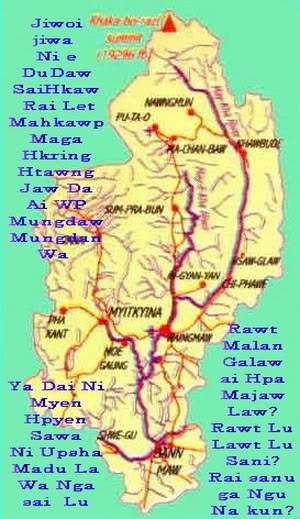By LAWI WENG
There has been no let up in the level of human trafficking from Burma to Thailand, according to a Thai rights group.
Speaking to The Irrawaddy on Wednesday, Sompong Srakaew, the director of the Labour Rights Promotion Network (LPN), which is based at the port of Mahachai near Bangkok, said, “We have rescued 70 victims of human trafficking this year. Ninety percent were Burmese.
“The brokers brought the workers from the [Thai-Burmese] border and sent them to the south of Thailand,” he said. “Many victims were sold onto fishing boats which were bound for Indonesia, Malaysia and South Africa. The women were sent to work in brothels.”
Last year, the LPN started working with the Seafarers' Union of Burma (SUB) and the Department of Special Investigations (DSI) to crack down on human traffickers and rescue victims in the southern part of Thailand.
Sompong said that the Thai government could be more effective by arresting more traffickers.
“The problem is that we ourselves cannot arrest the brokers,” he said. “The business of human trafficking is continuing unabated. The one good thing is that we are getting opportunities to rescue the victims.”
Human trafficking brokers in the region hand over workers to Thai employers. The brokers take a commission from the employers. The workers have no rights and have often are treated like slaves, according to LPN.
Victims who are sold to fishing vessels are never allowed shore leave when the ship docks and measures to prevent them escaping, such as locking victims in their cabins or handcuffing them, have been documented. Victims who manage to escape often get arrested and held in prison—or get killed.
According to an ethnic Mon staffer from an anti-trafficking organization in Mahachai, Burmese trafficking victims are frequently told that they have been sold to Thai employers for a period of one year. However, after one year of work for little or no pay, the victims are regularly refused release. Many victims have said they were too afraid to try to escape because they were told they would be killed, and are also afraid of approaching the Thai authorities for fear that they are complicit in the trafficking network.
The US State Department this week released a report titled “Trafficking in Persons” that ranks Burma as “Tier 3”—a country that has made no significant efforts to comply with the minimum standard for the elimination of trafficking.
The report said, “The regime's widespread use of and lack of accountability in forced labor and recruitment of child soldiers is particularly worrying and represents the top causal factor for Burma's significant trafficking problem.”
Men, women and children become victims of trafficking because the government has yet to address the systemic political and economic problems that cause many Burmese to seek employment in neighboring countries, the report said.
Many people from Burma seek employment in neighboring countries such Thailand, Malaysia and China. There are 2 to 3 million Burmese migrants working in Thailand, most of whom work illegally.
The Burmese government last year rejected the “Trafficking in Persons 2009” report from the US State Department. The government said that it had been tackling human trafficking and had set up anti-human trafficking offices along the borders of China and Thailand, and that the border authorities were working together to crack down on the trafficking networks.
Naypyidaw reported that 155 trafficking cases involving 302 victims were investigated in 2009, with 429 perpetrators convicted, up from 134 cases in 2008.
The Burmese government also held a human trafficking seminar in Bagan in January with other Mekong sub-regional nations Thailand, Cambodia, Laos , Vietnam and China, as well as UN officials. It said its aim was to improve cooperation toward the elimination of human trafficking.
Jun 17, 2010
Subscribe to:
Post Comments (Atom)
WUNPAWNG MUNGDAN SHANGLAWT HPUNG A NINGGAWN MUNGMASA
WUNPAWNG MUNGDAN SHANGLAWT HPUNG A NINGGAWN MUNGMASA
CHYE JU KABA SAI
Sa Du N'Gun Jaw La ai Majaw N'chying wa Chyeju Dum Ga ai,Yawng a Ntsa Wa Karai Kasang Kaw na N'Htum N'Wai ai Shaman Chye ju Tut e Hkam La Lu Nga mu Ga law







No comments:
Post a Comment